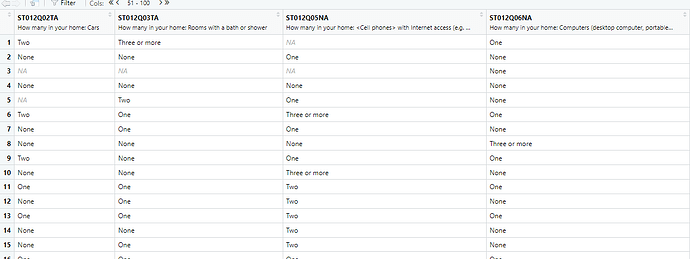Thank you I get this from
PISA_2018[1:6,1:3]|> dput()
PISA_2018 <- structure(list(CNT = structure(c(1L, 1L, 1L, 1L, 1L, 1L), levels = c("Albania",
"United Arab Emirates", "Argentina", "Australia", "Austria",
"Belgium", "Bulgaria", "Bosnia and Herzegovina", "Belarus", "Brazil",
"Brunei Darussalam", "Canada", "Switzerland", "Chile", "Colombia",
"Costa Rica", "Czech Republic", "Germany", "Denmark", "Dominican Republic",
"Spain", "Estonia", "Finland", "France", "United Kingdom", "Georgia",
"Greece", "Hong Kong", "Croatia", "Hungary", "Indonesia", "Ireland",
"Iceland", "Israel", "Italy", "Jordan", "Japan", "Kazakhstan",
"Korea", "Kosovo", "Lebanon", "Lithuania", "Luxembourg", "Latvia",
"Macao", "Morocco", "Moldova", "Mexico", "North Macedonia", "Malta",
"Montenegro", "Malaysia", "Netherlands", "Norway", "New Zealand",
"Panama", "Peru", "Philippines", "Poland", "Portugal", "Qatar",
"Baku (Azerbaijan)", "B-S-J-Z (China)", "Cyprus", "Moscow City (RUS)",
"Moscow Region (RUS)", "Tatarstan (RUS)", "Romania", "Russian Federation",
"Saudi Arabia", "Singapore", "Serbia", "Slovak Republic", "Slovenia",
"Sweden", "Chinese Taipei", "Thailand", "Turkey", "Ukraine",
"Uruguay", "United States", "Vietnam"), label = "Country code 3-character", class = "factor"),
OECD = structure(c(1L, 1L, 1L, 1L, 1L, 1L), levels = c("No",
"Yes"), label = "OECD country", class = "factor"), ISCEDL = structure(c(3L,
3L, 3L, 3L, 3L, 3L), levels = c("ISCED level 1", "ISCED level 2",
"ISCED level 3", "ISCED level 4", "ISCED level 5", "Valid Skip",
"Not Applicable", "Invalid", "No Response"), label = "ISCED level", class = "factor")), row.names = c(NA,
-6L), class = c("tbl_df", "tbl", "data.frame"))
